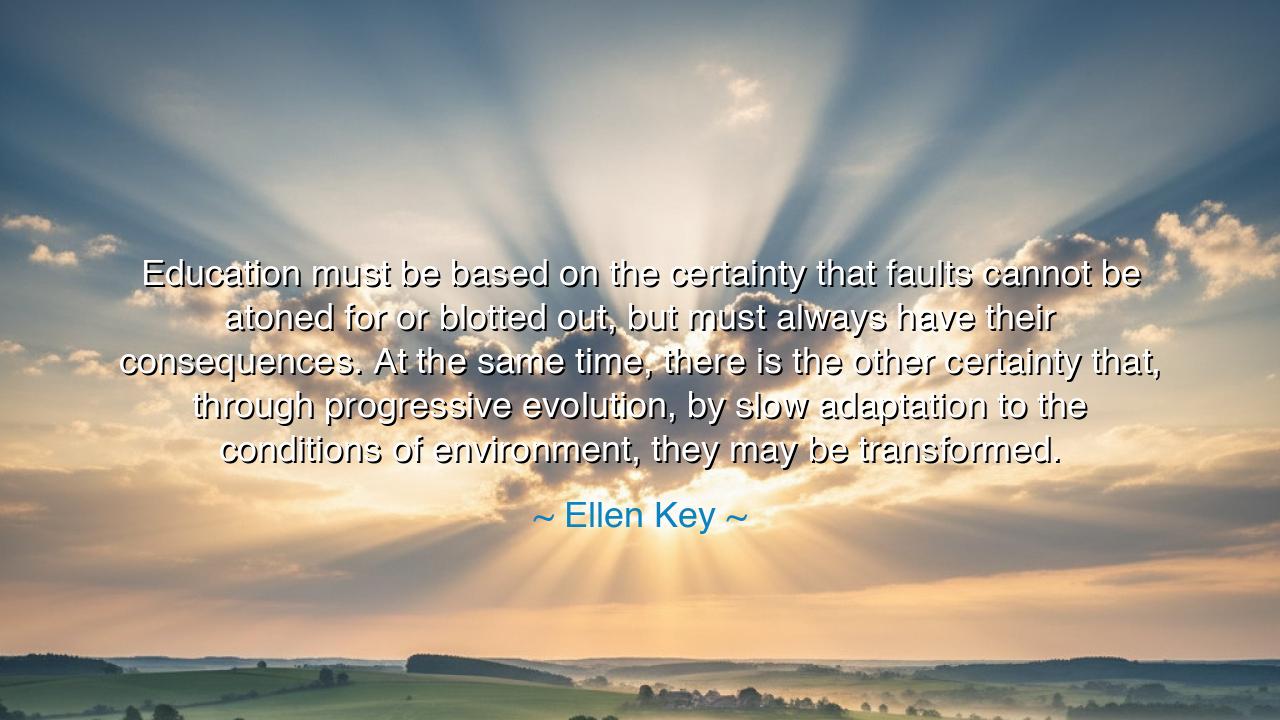
Education must be based on the certainty that faults cannot be
Education must be based on the certainty that faults cannot be atoned for or blotted out, but must always have their consequences. At the same time, there is the other certainty that, through progressive evolution, by slow adaptation to the conditions of environment, they may be transformed.






The words of Ellen Key, the Swedish reformer and philosopher of education, echo like the voice of conscience across the centuries: “Education must be based on the certainty that faults cannot be atoned for or blotted out, but must always have their consequences. At the same time, there is the other certainty that, through progressive evolution, by slow adaptation to the conditions of environment, they may be transformed.” In this declaration, she weds justice and hope together, reminding us that no misdeed vanishes without effect, yet no soul is beyond renewal.
The origin of this truth comes from Key’s life at the turn of the twentieth century, when she called for a new vision of schooling rooted not in punishment or rigid authority, but in respect for the child’s inner growth. She saw that faults—whether of ignorance, of error, or of moral weakness—could not simply be erased by harsh punishment or ritual repentance. They left marks, lessons, and consequences. Yet she also saw that education, if guided with patience, could turn even these faults into instruments of growth. Through adaptation to life’s conditions, the very weaknesses of a child could, over time, be reshaped into wisdom, strength, and compassion.
History illustrates this wisdom clearly. Consider the life of Nelson Mandela. In his youth, he embraced confrontation, and his choices led him into prison for decades. Those faults of anger and impatience could not be erased; their consequence was the loss of freedom, the suffering of years behind bars. And yet, through the long progressive evolution of reflection and learning in captivity, Mandela’s spirit was transformed. He emerged not as a man of bitterness but as a reconciler, one who could lead a nation into peace. His story shows that while consequences remain, they can become the soil in which transformation grows.
The ancients knew this truth as well. The Greeks spoke of hamartia, the tragic flaw, which always bore its fruit. Oedipus could not undo his actions, nor blot them out. Yet humanity learned from his tale, for his faults became the eternal warning against pride and blindness. Education, then, is not to shield us from the results of our errors, but to teach us how to transform those errors into guides for the future.
O children of tomorrow, take this lesson deep into your hearts: your faults will leave their marks. They cannot be hidden or erased, for the law of consequence is eternal. But despair not! For through patient adaptation, through slow and steady learning, you may turn even your scars into strengths. The fire that once burned you can become the light by which you guide others. The weakness that once humbled you can become the compassion with which you embrace your fellow travelers.
The lesson for us is clear: do not shield students, or even yourself, from the truth of consequence. To do so is to leave them unprepared for life. But also, do not crush them with hopelessness. Teach them instead that their mistakes are seeds—painful perhaps, but capable of yielding fruit if tended with patience. The role of education is to hold both truths at once: that errors matter, and that errors can be transformed.
Practical action lies before you: when you fail, accept the consequences with humility, but do not stop there. Reflect, adapt, and slowly evolve into one who rises stronger from the fall. When guiding others—children, students, or companions—do not erase their mistakes for them, nor condemn them without mercy. Instead, show them the path by which a fault may become a lesson, and a lesson may become transformation. In this way, both justice and hope are fulfilled.
Thus let Ellen Key’s words endure: “Education must be based on the certainty that faults cannot be atoned for or blotted out, but must always have their consequences… yet through progressive evolution, they may be transformed.” Hold this wisdom close. For life itself is the greatest teacher, and its lessons, though hard, are the very instruments by which the soul is perfected.






AAdministratorAdministrator
Welcome, honored guests. Please leave a comment, we will respond soon